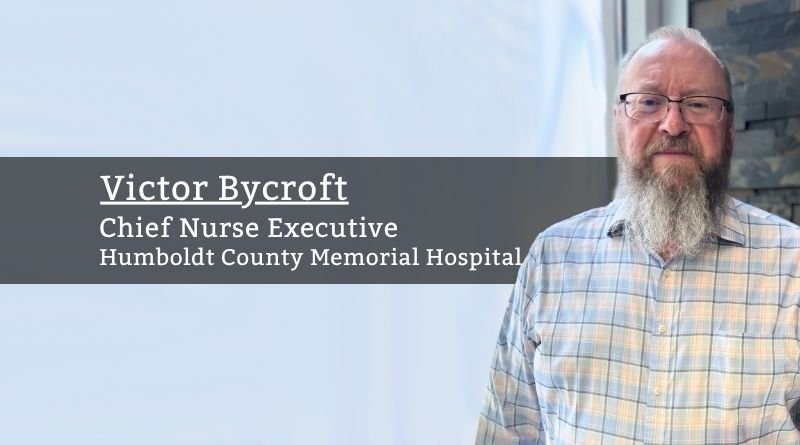By Victor Bycroft, Chief Nurse Executive, Humboldt County Memorial Hospital
This may be a controversial opinion, but nurses are the backbone of any healthcare organization. While ancillary services are vital and provide invaluable portions of care, nurses are at the top of the food chain when it comes to direct, hands-on patient care. This is why the current and worsening shortage of nurses in this country is so concerning for all aspects of healthcare.
Nursing shortages are not a new concept. They have existed to some extent as long as nurses have been utilized, typically running in cycles with an ebb and flow of approximately eight to ten years. Each decline brings about mild panic for a short time, then the available pool increases, and everyone breathes a collective sigh of relief. However, since 2020, the nursing profession has seen a steady decline in available numbers, and the future appears grim.
The COVID-19 pandemic briefly highlighted nurses as heroes, but the fanfare quickly dulled, leaving nurses feeling disenfranchised and unappreciated. This led to an unprecedented exodus of nurses from the profession. This presents numerous challenges for any organization relying on a stable pool of nurses to provide care. Still, these challenges can vary based on the organization’s size, geographic location, and other factors.
The nursing shortage will not go away any time soon. We must continue to adapt to this new paradigm as we seek to provide high-quality care.
All organizations must be acutely aware of the challenges posed by competition in recruiting nurses. Urban areas tend to attract a larger number of candidates but also have more facilities nearby competing for those candidates. Rural areas struggle to draw many candidates but typically have a greater distance between facilities. This does not necessarily reduce geographic concerns, as nurses who migrate to rural areas tend to be more willing to travel a greater distance for the right job and environment.
Wages have always been a concern for nurses, with many feeling that their compensation is not commensurate with the expectations set on them. This leaves healthcare facilities chasing a mark that is often difficult to pinpoint, let alone nail down. Available jobs far exceed the number of nurses to fill those positions. Nurses can shop around for the best wages and benefits, causing hospitals to compete more than ever. To remain viable in the recruitment process, facilities continue to increase the starting salaries for new nurses as well as for seasoned nurses switching to new roles. This can lead to tenured staff nurses feeling undervalued and unappreciated as they see individuals starting with wages at or about what they have taken years to achieve. This can also lead to increased healthcare costs as facilities raise prices to offset the salary increase.
This leads to higher turnover rates in facilities and areas that are unable to keep pace with the market. Imagine being a hospital in northern Iowa. Iowa ranks 48th out of 50 states and the District of Columbia for average nurse salary, while Minnesota ranks 14th. A short drive and a little paperwork between nurse license compact states can allow a nurse to earn $20,000 more per year. Mobility can lead to even higher wages, with California offering double the average annual salary compared to Iowa. With exceedingly tight margins, the ability to compete and attract nursing staff is low, especially in smaller markets.
Another challenge is the change in expectations among nurses. While this is often attributed to younger generations, recent trends show that nurses are looking for improved work-life balance across the continuum. This means fewer nurses are willing to work the shifts required in a hospital setting, specifically evenings, weekends, and holidays. In a workplace that never closes, this leads to frustration among all nurses; those willing to work those shifts are asked to do more, and those who don’t want them are pushed to work shifts that do not fit their ideal schedule.
With fewer nurses available, the remaining staff must take on an increased workload. Nurses frequently complain about being required to do more with less. This can lead to an increase in the number of shifts per week, more hours during those shifts, fewer breaks, and increased stress. All of these factors can lead to increased dissatisfaction and disengagement among nurses, commonly described as nurse burnout. Regardless of what one may think about burnout and its causes, the effects are no less devastating than PTSD in combat veterans.
A shortage of nurses can compromise the quality of care each patient receives. While nurses will do everything within their power to provide high-quality care, a reduction in the workforce will inevitably lead to less time spent with each patient, resulting in delayed treatments, decreased patient satisfaction, and, in the worst-case scenarios, actual harm to the patient.
The nursing shortage will not go away any time soon. We must continue to adapt to this new paradigm as we seek to provide high-quality care. Most importantly, we must support our nurses and make them feel appreciated for their critical work. The “pizza party” has gotten a bad rap recently. Instead, if you are in a leadership role, get out and talk to your nursing staff. Help them to see you as a friend and supporter, not someone to be feared. There is nothing more important in your work than making your nursing staff feel appreciated. Be sure to thank your nurses when you see them.


